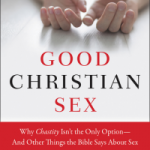Content Note: Rape
I recently read a post by Emily Wierenga entitled, “What I Want My Son to Know About Sex.” There was a lot in the post that I disagree with, which isn’t surprising. I’m not really on the same page as most evangelical Christians when it comes to sexual ethics. One line in this piece made me think, though. I wanted to talk about that line.
Toward the end of her piece, Wierenga tells her son,
I pray for you, that you will shine, that you will be a man among men, a leader for others to follow, a Joseph who stands up to Potipher’s wife. The world needs more Josephs, son. It needs a few good men.
I’m going to respond to this line, not to pick on Wierenga, but because I think this is something every Christian–and especially every Christian who teaches Bible stories to children–needs to think about.
We Christians love our Bible stories and our Bible “heroes,” and we love oversimplifying these stories, white-washing all the characters, and putting them in picture books to read to children. There’s not necessarily anything wrong with teaching Bible stories to children. I think it’s good to treat children as if they are a part of the faith community that they are being raised in, and to let them know and share in the stories that the faith community sees as important. But sometimes, I wonder about the ways we present some of our favorite stories and heroes to children (and even to adults for that matter).
I wonder what underlying messages we are teaching by simplifying these stories to fit in a picture book, and by making “heroes” out of characters that often acted in ways that were anything but heroic.
I written before about the story of David and Bathsheba, which is quite possibly a story of a king using his power to rape someone. This is one example of a story that children hear in Sunday School, probably before they have any idea what rape or sex is. Hell, there’s a Veggie Tales version of this story in which Bathsheba is portrayed as a RUBBER DUCK.
- I love these veggies, y’all, but I can’t even with this.
Many of us were raised with this story, which often has the effect that we take what happens in it for granted and don’t think about it too deeply.
Well, we need to.
Our churches are deeply saturated in rape culture. If we’re going to challenge that fact we need to rethink our telling children a story about rape in such a way that the rapist is an imperfect hero while the victim is so unimportant that we might as well replace her with a rubber duck.
Back to the story of Joseph and Potiphar’s wife–another one I started hearing in Sunday School at a young age. A nameless, horny woman wants to sleep with Joseph but he’s so full of integrity that he runs away. Nameless woman is pissed and wants vengeance so she tells everyone, “Joseph raped me!” and poor, poor Joseph goes to prison so God can test him.
What do we learn from this?
Women are sin? They are out to get men? When caught or rejected, they will lie and accuse men of rape? Geez, this sounds like an MRA fairy tale!
Emily Wierenga isn’t the only Christian telling her son to be a Joseph. In fact, I remember having a Patch the Pirate tape (any fellow ex-IFB folks in the house?) that taught children to be like Joseph and “put on your running shoes” when “sin comes knocking at your door.” I used to sing it, not realizing that I was the sin the song was talking about.
When I was raped at 16 and considered telling someone, I remember specifically thinking of this story. I remember thinking to myself, “No, I’m not going to be a Potiphar’s wife. I’m going to take responsibility for my own sin.”
I doubt I’m the only one. How many women who were raised on this story grew up and bought into this stereotype of the temptress who lies about rape when she doesn’t get her way?
And how many Christian leaders buy into that same stereotype? Sheldon and Parent did a study in which, the majority of clergy members they interviewed blamed victims who had been raped. I’m sure the story of Potiphar’s wife isn’t the sole factor contributing to these results, but it isn’t going to challenge any clergy member’s tendency to not believe rape survivors, that’s for sure.
I’m not saying we necessarily should stop teaching these Bible stories to children. In fact, we need to talk to children about rape and sexual assault because children often have to deal with those things in this fucked up world.
But we need to seriously rethink the messages we send as we tell these stories.
Who are the heroes and who are the villains? Whose narrative do we treat as important and who do we treat as mere props? Are the ways we tell these stories challenging or reinforcing rape culture? Are we doing justice to victims and survivors? Are we setting up children (and adults) for shame and self-blame if they ever become survivors?
We need to be asking these questions long before we start setting up flannelgraph boards.
















